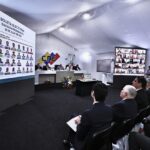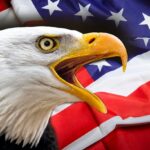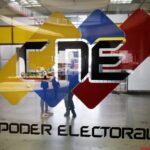
On March 1, a meeting took place in Moscow between the Vice President of Venezuela, Delcy Rodríguez, and the Minister of Foreign Affairs of Russia, Sergey Lavrov, with the aim of finding ways to solve the situation in Venezuela.
1.- Russia supports the efforts of the Maduro Government
The Russian chancellor has reiterated Moscow’s support for the efforts of Venezuelan President Nicolás Maduro, aimed at stabilizing the country’s situation, as well as reaffirming its solidarity with the legitimate Government of Caracas.
Lavrov has insisted that the solution to the crisis in Venezuela must be carried out without external pressure or ultimatums. The chancellor added that Russia is willing to join forces with regional and international mediators to establish a dialogue with the aim of resolving the situation of the South American country. He also pointed out that the Venezuelan opposition has systematically rejected all dialogue with the Maduro government “following the instructions of Washington.”
2.- Relocation of the European office of PDVSA to Moscow
The VP of Venezuela announced that Maduro gave instructions to move the European office of the Venezuelan state oil company PDVSA from its current location in Lisbon (Portugal) to Moscow, stating that this measure must “strengthen” cooperation between Russia and Venezuela.
Also, Rodriguez has declared that Caracas will take legal measures to recover those Venezuelan assets abroad that have been handed over to the opposition.
3.- Buying medicine and food from Russia
Delcy Rodriguez has indicated that “President Nicolás Maduro has given very clear instructions also in that sense that the food and medicines needed by the people of Venezuela be acquired in Russia. ”
In addition, Rodriguez added that Caracas will establish an industrial investment to “jointly” produce drugs in Venezuelan territory.
RELATED CONTENT: Russia Reports: US Preparing a Violent Change of Government in Venezuela
4.- Moscow sent wheat and 7.5 tons of medicines to Venezuela
Russia has already sent to Venezuela 7.5 tons of medicines as humanitarian aid and is studying the possibility of sending another shipment at the request of the Venezuelan Government. “This lot was sent at the expense of our contribution to the World Health Organization and the project being implemented by the Pan American Health Organization,” Lavrov explained.
In addition, the Russian minister has expressed confidence that a massive supply of wheat sent by Moscow “has been a very significant help to the Government of Venezuela to solve current problems.”
5.- Legal measures to recover Venezuelan assets abroad
“Venezuela will exercise legal actions to guarantee our right to defense and due process in the defense of assets, interests and legitimate rights as a country,” said Rodríguez in reference to the Venezuelan gold that the Bank of England refuses to return to the Maduro Government. And also in relation to the seized of CITGO by the Trump’s administration.
6.- Signing of new bilateral agreements
Caracas is planning to sign new agreements with Russia “for the expansion of what have been the 264 agreementes” that were signed on December 5 during President Maduro’s visit to Moscow.
7.- Armed groups to destabilize Venezuela
Likewise, Rodríguez denounced the US plan to form armed “irregular groups” to destabilize the situation in the South American country.
The Venezuelan vice president has indicated that this “is not a secret to anyone,” and criticized “the actions of the US government in support of irregular groups, in support of extremist groups, in support of terrorist groups to destabilize and to disrupt the peace.” “That is not going to happen in Venezuela,” she assured.
In this regard, the Russian side has expressed concern about Washington’s plans to “arm militants to destabilize the situation in Venezuela.” According to Lavrov, there is information that points to the US plans to buy, in a country in Eastern Europe, “mortars, portable air defense systems and a series of other types of weapons and send them to the areas closest to Venezuela.”
RELATED CONTENT: India, China and Russia Support Venezuela and UN Charter
8.- Possibility of military intervention
Lavrov said that the idea of military intervention in the Bolivarian nation is supported only by the United States and its closest allies.
“No country, except one or two of the closest US allies, supports or admits the possibility of a military intervention,” the foreign minister said, adding that if the neighboring countries of Venezuela do not support it, this would complicate the carrying out of Washington’s plan.
On the other hand, Lavrov has not ruled out completely that the US Administration could launch a military operation with the objective of unseating Maduro from power.
The Russian minister has asserted that Elliott Abrams, special US envoy for Venezuela does not hide the fact that his function does not include the search for a peaceful settlement.
“He deals exclusively with increasing the tensions that could create a situation which would cause – as the US wants – an explosion in Venezuela, bloodshed, and thus justify military intervention,” he warned.
9.- Illicit sanctions as new imperial business
The Venezuelan VP called on the international community to lift the Western sanctions imposed against Caracas as the best way to solve the economic and social situation in Venezuela.
“Venezuela needs this criminal blockade to be lifted, and I am certain that it will not happen, because the illegal sanctions have become the best new imperial business that exists,” Rodríguez said. “It is the theft of resources by only pressing a key.”
10.- Voting on Venezuela in the UN Security Council
The Security Council of the UN should not approve documents of a destructive nature, Lavrov said about the recent vote on the draft resolution of the United States. -Looked by Russia and China- that declared the 2018 Venezuelan elections illegitimate and called for new elections.
“Badly formulated” question from CNN
Before answering a CNN journalist who asked about this last key, VP Rodriguez asked if the US network was going to broadcast her response. After receiving an affirmative response, Rodriguez told the reporter that his question was “poorly formulated”.
“Because, in reality, it is not that we refuse to hold elections, but we are defending the Constitution of the Bolivarian Republic of Venezuela. Because the elections were already held when appropriate, in 2018, and President Nicolás Maduro was ratified for his new term 2019-2025,” stressed the official.
Translated by JRE/EF%
- orinocotribunehttps://orinocotribune.com/author/orinocotribune/
- orinocotribunehttps://orinocotribune.com/author/orinocotribune/
- orinocotribunehttps://orinocotribune.com/author/orinocotribune/
- orinocotribunehttps://orinocotribune.com/author/orinocotribune/
Share this:
- Click to share on Twitter (Opens in new window)
- Click to share on Facebook (Opens in new window)
- Click to share on LinkedIn (Opens in new window)
- Click to share on WhatsApp (Opens in new window)
- Click to share on Reddit (Opens in new window)
- Click to share on Telegram (Opens in new window)
- Click to email a link to a friend (Opens in new window)




